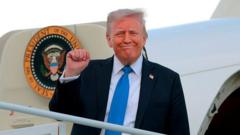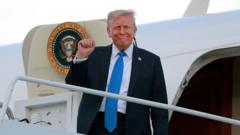After a prolonged political impasse, the election of Friedrich Merz as Chancellor spells a new era for Germany amid economic and social challenges.
Friedrich Merz's Government Set to Resume German Leadership After Extended Stalemate

Friedrich Merz's Government Set to Resume German Leadership After Extended Stalemate
Germany's political landscape sees a shift as Friedrich Merz prepares to lead a new coalition government.
In a legislative turn of events, Germany is on the brink of welcoming conservative leader Friedrich Merz as the country's new Chancellor. Following months of political uncertainty, Merz has secured a coalition with the Social Democrats, aiming to revitalize the nation’s economy and amplify its global standing. His swearing-in follows the dissolution of the previous government, leading to expectations for decisive governance in turbulent times.
“I believe we must ensure the success of this government is a historical imperative,” stated Merz, who recently formalized the coalition agreement. The vote in parliament sees Merz's coalition claiming a marginal majority of 328 seats in the Bundestag – just enough to assume control. The recent federal election demonstrated a slight increase in support for Merz’s Christian Democratic Union (CDU), while the Social Democrats (SPD) suffered significant losses.
Merz's agenda includes tightening immigration policies, enhancing infrastructure, and restoring relations with key European allies. He has already navigated legislation focused on defense and security spending, circumventing Germany’s rigid debt limits to bolster military investments.
Political analysts recognize Merz's challenges with public opinion, emphasizing the critical need to demonstrate effective governance to counteract rising far-right sentiments, particularly from the Alternative für Deutschland (AfD), which is advocating for aggressive immigration policies and closer ties with Russia. The AfD's recent classification as an extremist party has brought attention to its contentious role in the political arena, prompting renewed discussions about the potential for its prohibition.
Meanwhile, Merz faces the delicate task of managing relations with the United States, especially with former President Donald Trump’s allies showing interest in the new administration's direction. Speculation arises regarding Merz's potential charm offensive on the golf course to foster a robust transatlantic alliance.
His initial state visits are geared towards Paris and Warsaw to mend ties that have been perceived as strained. Polish officials are optimistic about revitalizing German-Polish relations, reinforcing mutual commitments to defense collaboration, and looking forward to a more proactive role for Germany in the European Union following a period of perceived decline.
As the political arena in Germany braces for substantial shifts under Merz's leadership, questions linger about the sustainability of his coalition and the impact of rising populism on the broader German and European landscape.




















